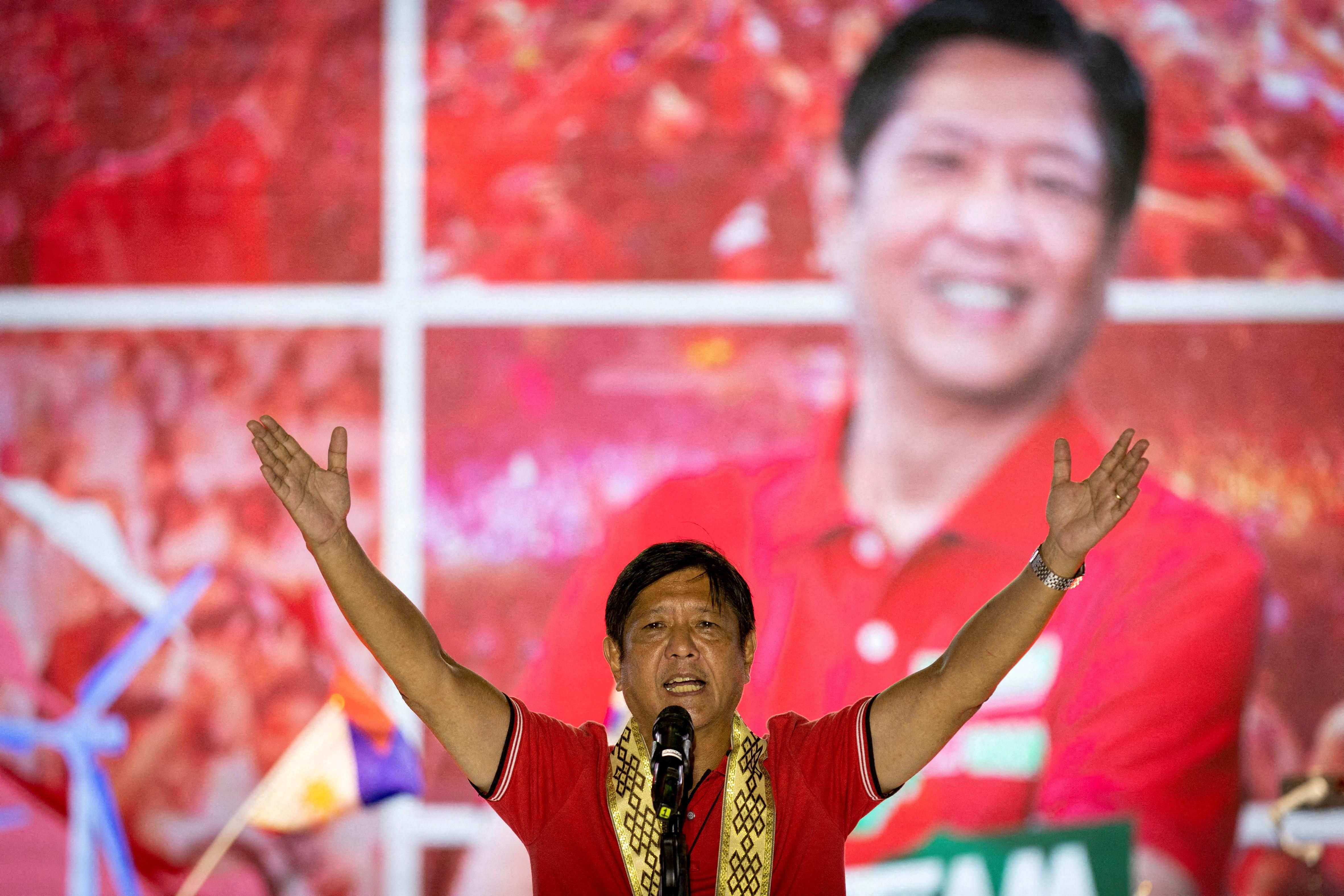The Philippine presidential election is a week away, and two uncomfortable characteristics of modern democracy in the country — dynasty and disinformation — are expected to shape the result.
Leading the polls by a wide margin is Ferdinand Marcos Jr., the son of the late dictator. The elder Marcos ruled the Philippines for 21 years, including eight years under martial law, before he was overthrown in 1986 by the so-called “People Power” uprising against his kleptocracy.
Two scions team up. Marcos has partnered with VP hopeful Sara Duterte, daughter of the outgoing President Rodrigo Duterte, who was ahead of her running mate in the surveys before she opted to run for the second-highest office instead. Although she has maintained a distance from her father, the Marcos-Duterte combination is a potent one that spans the country’s geography and demography, allying the northern districts loyal to Marcos with the deep south, where the Dutertes are most powerful.
Both have enjoyed the privilege of power under their respective fathers’ rules. Marcos entered politics as a vice governor in 1981, when his dad was still in power, and until recently Duterte was mayor of her hometown of Davao City, her father’s old job.
All in the family. Dynasties, a longtime staple of Philippine politics, have tightened their grip on power in recent years. Research by online news site Rappler shows that so-called "fat" dynasties – where several members simultaneously hold elected posts — now occupy 29% of local offices, 80% of governorships, and two-thirds of seats in Congress.
To prove the point, Duterte’s two sons are eyeing congressional and mayoral seats in the upcoming elections, and Marcos’ son is also being prepped as an heir-apparent.
Laws that are supposed to curb the influence of political families don't work — hardly surprising given that they've been passed by politicians who themselves belong to dynasties. For instance, many posts are limited to three consecutive terms, but the trick is to get a spouse or child to keep the seat warm for one term, and then run again.
Still, being a Marcos also comes with serious baggage because it’s perhaps the most polarizing name in Philippine politics.
Marcos’ ascent is a divisive subject and opens up the wounds of the past. However, where some see the entrenched power of dynastic politics and patronage, propelled by a slick PR campaign that has done a remarkable job of whitewashing the family’s sins, a new generation sees vindication.
Indeed, Marcos has found his edge in demographics. The majority of Filipinos who’ll vote for president on May 9 are under 30 years old. They didn’t grow up under his father’s martial law regime, under which 70,000 people were detained, 34,000 tortured, and over 3,000 killed.
The younger Marcos’ carefully crafted rise to presidential frontrunner status is the culmination of a years-long, sophisticated social media disinformation strategy pushing his father’s rule as a golden era. He’s also been careful to avoid debates so he doesn’t have to talk about what his family did, and he lets big-name local politicians campaign on his behalf.
Meanwhile, his main rival, Vice President Leni Robredo, has been the target of a constant barrage of online disinformation, much of it about her and her family’s sex lives, by pro-Marcos supporters.
When the likes of Facebook, Twitter and Wikipedia have taken action against his trolls, bots, spam and manipulation, and even the powerful Catholic Church rejected the online “historical revisionism,” the Marcos campaign responded by pivoting to newer platforms like TikTok to appeal to the Philippines’ massive vote bank of Gen-Z’ers, converting teenagers and influencers who are far removed from the trauma of martial law to sympathize with the Marcos dynasty.
Can anyone beat the dynamic dynastic duo? Of the other candidates, the only one with a shot — albeit a long one — at being a spoiler for the Marcos-Duterte ticket is Robredo, also the lone female presidential candidate.
Robredo, who beat Marcos for VP in 2016, has carved out a reputation as a fierce critic of Duterte's strong-arm tactics. Although she trails Marcos by double digits, her campaign is experiencing a late surge in numbers attending her vibrant, proudly feminist rallies in a political culture that’s as misogynistic as it is dynastic.More For You
For many in Iran, it’s a waiting game for how long Ayatollah Khamenei has left to live.
Most Popular
In a 30-minute call on Thursday, President Donald Trump reportedly told Ukrainian President Volodymyr Zelensky he wants to end the war with Russia as soon as possible — aiming for a deal by summer, but ideally within weeks.
Former British ambassador to the U.S. Peter Mandelson leaves his residence after he was released following his arrest by London police on Monday on suspicion of misconduct in public office, following the release of U.S. Justice Department files linked to the late financier and convicted sex offender Jeffrey Epstein, in London, Britain, February 26, 2026.
The ghost of Jeffrey Epstein continues to haunt the world.
Think you know what's going on around the world? Here's your chance to prove it.
